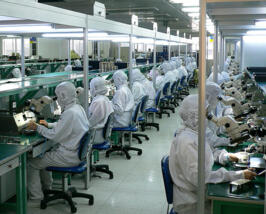Drop in Job Security Concerns Boost Worker Confidence in NYC
Hudson Employment Index (SM) climbed 2.4 points in January to 90.3.

Hudson Employment Index (SM) climbed 2.4 points in January to 90.3.

Small business confidence in the American economy rebounded in January as owners reported substantially fewer cash flow issues in surveys conducted for this month’s Discover® Small Business Watch (SM).

More than three-quarters (76 percent) of U.S. workers report to a Caucasian boss and just one-third (34 percent) state their boss is a woman, according to a new Hudson survey.

The economic confidence of consumers in Chicagoland rose significantly during the fourth quarter of 2006.

The Hudson Employment Index (SM) fell 2.6 points to 102.7 in December, primarily as a result of lowered job satisfaction and increased job loss concerns. The monthly measure lost ground following a nearly four point rise in November.

Worker confidence among accounting and finance professionals fell to a 2006-low in December after hitting a record high the previous month. The group’s Hudson Employment Index SM dropped 11.2 points to 106.0.

After spiking to an all-time high in November, worker confidence among Hispanics fell a dramatic 10.2 points this month, as the Hudson Employment Index SM for Hispanics dropped to 103.5.

Worker confidence among IT professionals decreased in December after hitting a 2006-high last month as the group’s Hudson Employment Index SM fell six points to 109.8

Confidence among workers in the legal sector fell sharply in December as this group’s Hudson Employment Index SM plummeted 10.4 points to 105.8.

Confidence among manufacturing workers continued to rise in December, as the sector’s Hudson Employment Index SM jumped six points to 97.4, tying the 2006-high.

The Hudson Employment Index SM for healthcare workers rose for the fourth consecutive month, gaining 1.6 points to register 109.3 in December.

After spiking last month, worker confidence in California fell substantially in December as the state’s Hudson Employment Index SM dropped 9.3 points to 111.3.

Worker confidence in Florida fell to a 2006-low in December, as the state’s Hudson Employment Index SM plummeted nine points to 112.4.

After four consecutive months of increasing worker confidence, Ohio’s Hudson Employment Index SM fell 4.9 points to 102.9.

For the fourth consecutive month, worker confidence in Pennsylvania increased in December, as the state’s Hudson Employment Index SM gained 1.2 points to 104.5.

Hudson Employment Index SM slipped 3.7 points to 116.4.

The Hudson Employment Index SM for Atlanta workers inched up .8 points to 115.8 in December. Strong hiring expectations were offset by increased personal finance concerns.

Hudson Employment Index SM for Boston workers remained fairly steady in December, edging up .5 points to 97.7.

After spiking in November, the Hudson Employment Index SM for Chicago fell 5.0 points in December to 94.6.

The Hudson Employment Index SM for Dallas workers fell slightly this month, as worker confidence dropped 1.6 points to 109.1 in December.